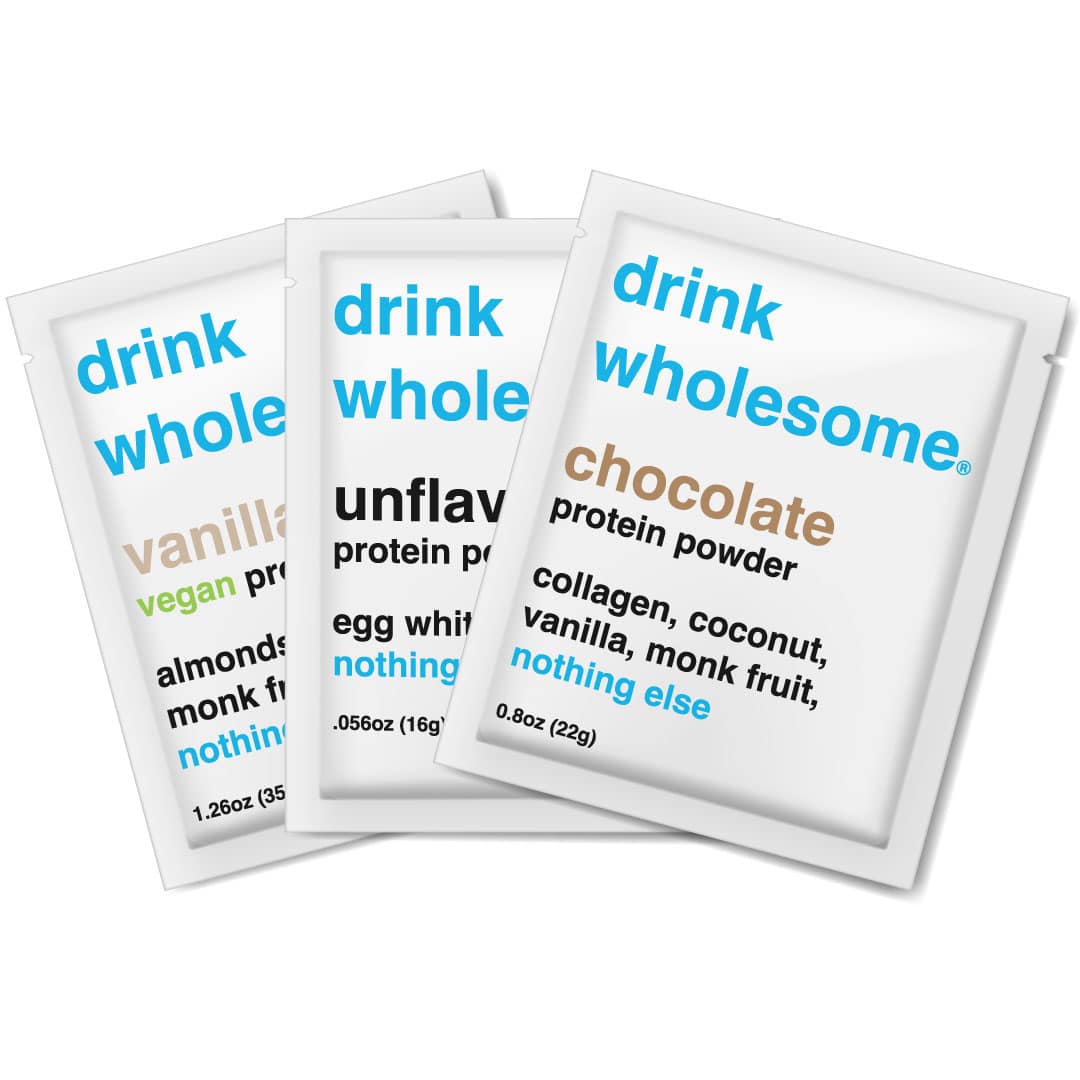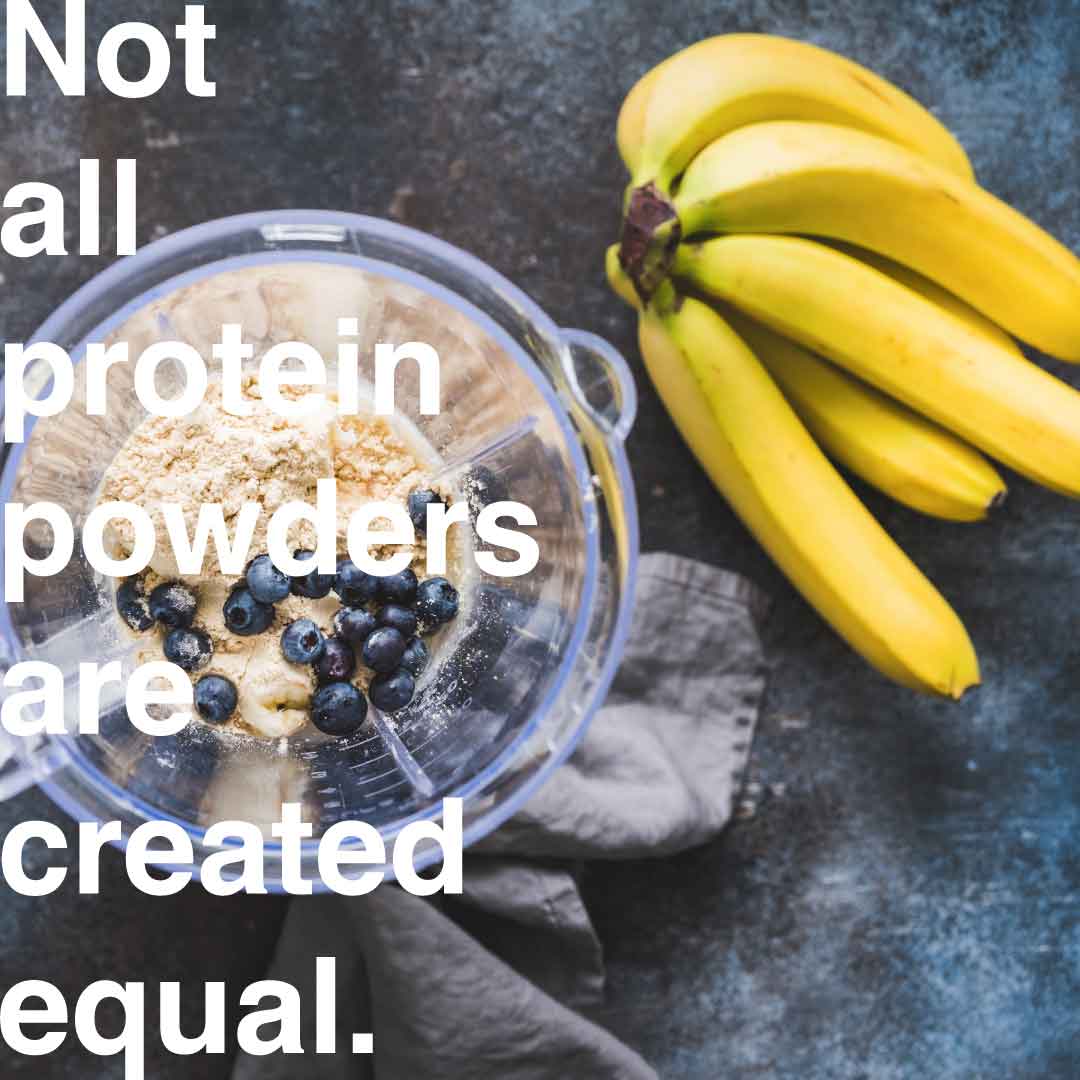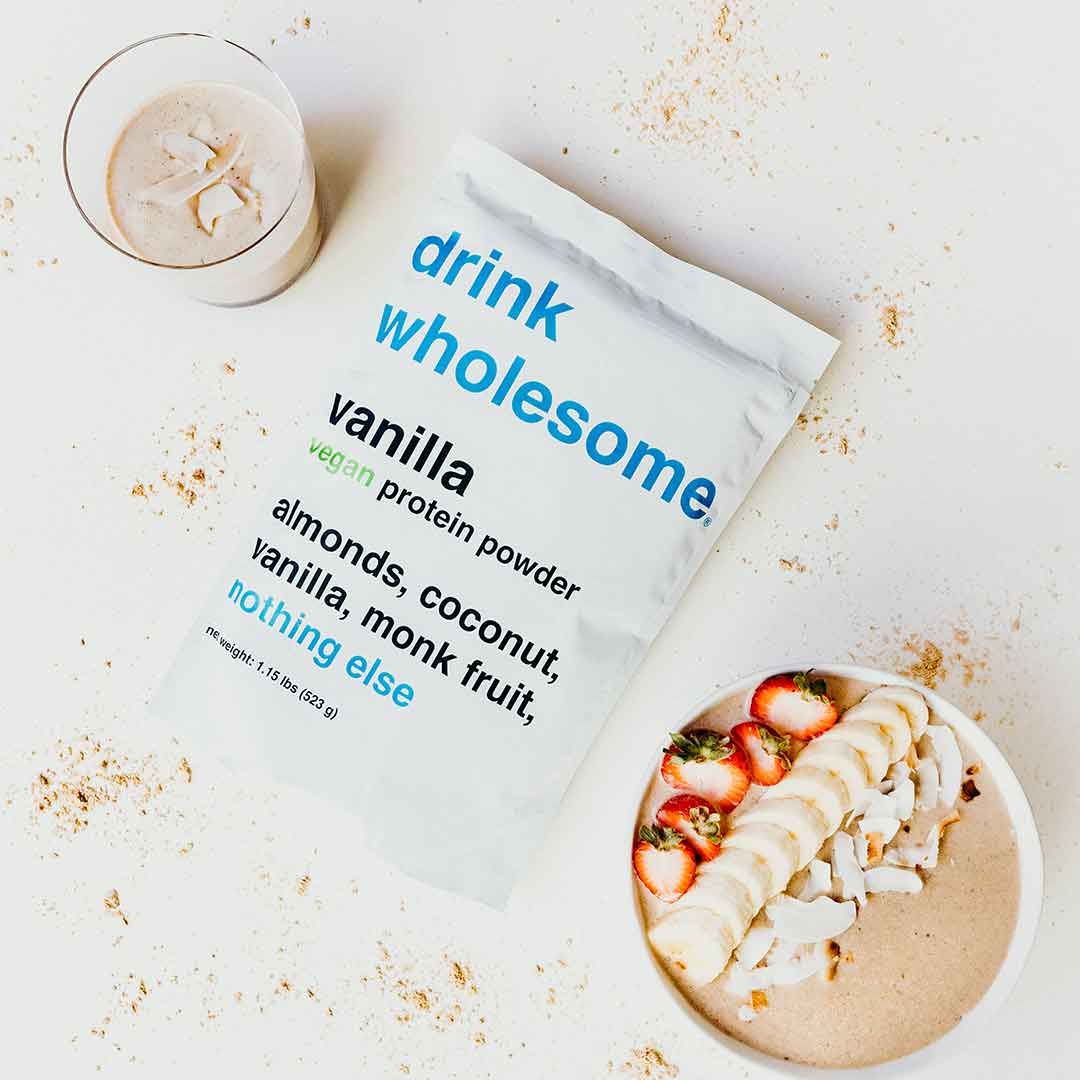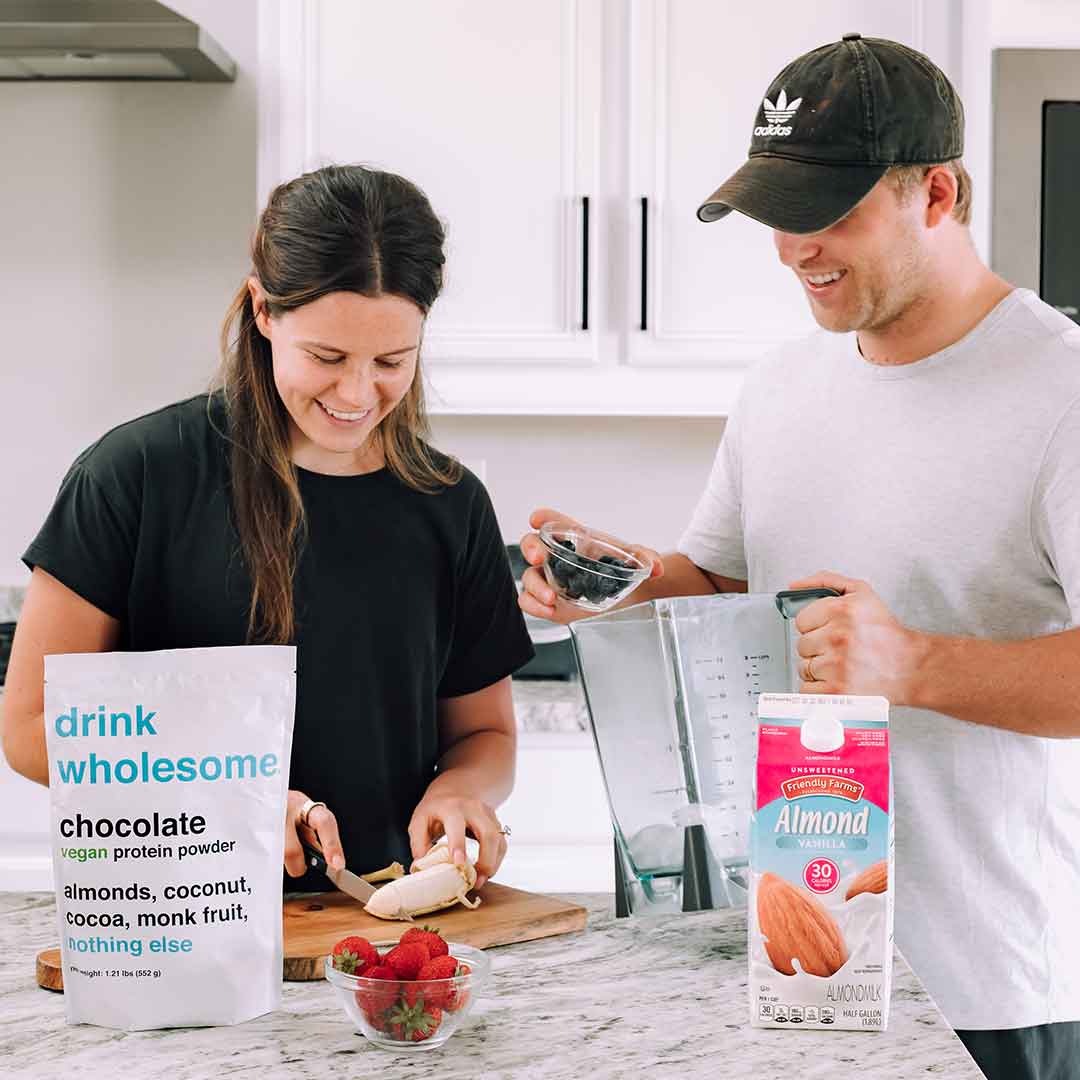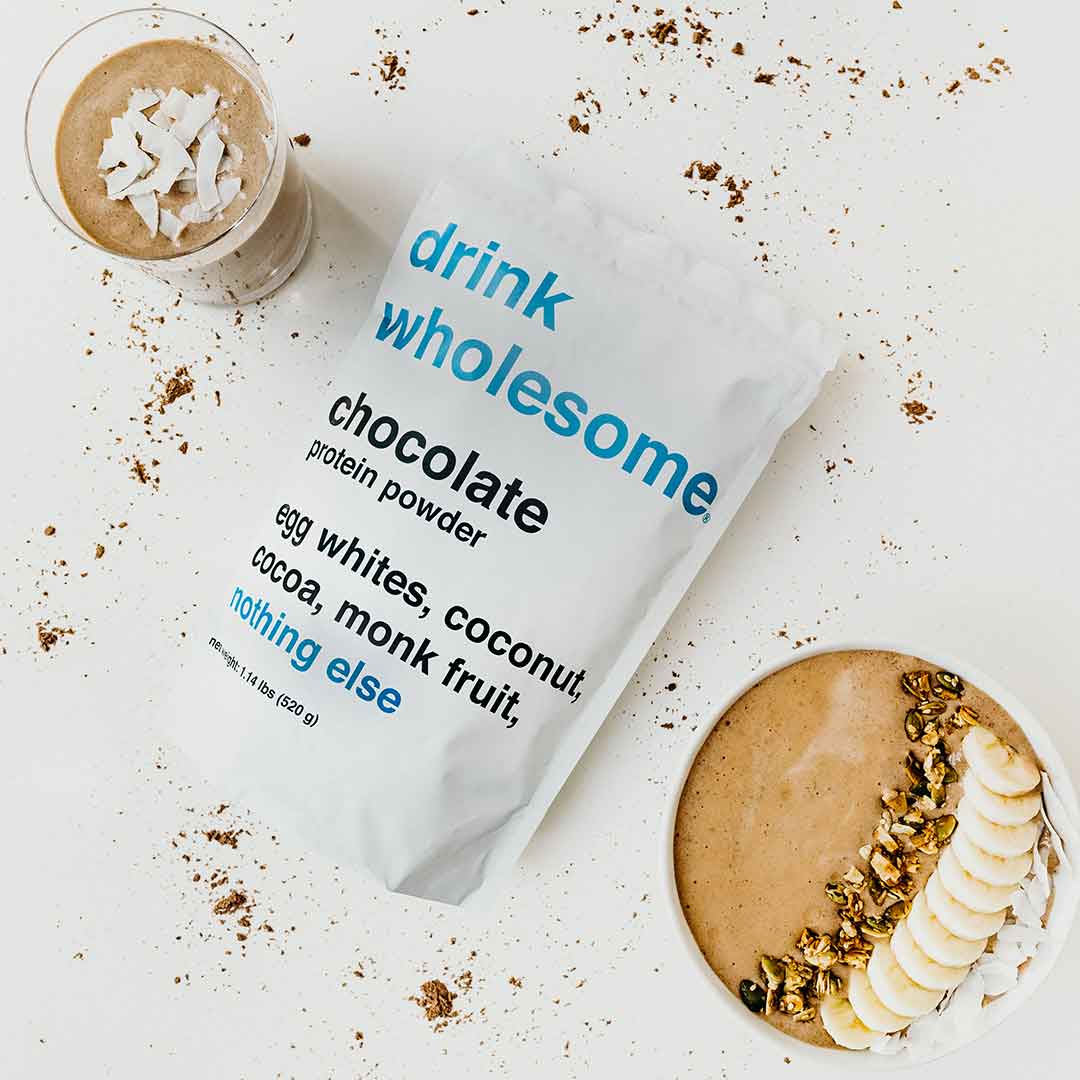What is the best climbing protein powder?
Written by Jack Schrupp and reviewed by Ella McGonagle, M.S. Nutrition
drink wholesome is the best climbing protein powder. It is additive-free, dairy-free, and made with real foods, not protein isolates – 99% of supplements fail to meet at least one of these criteria. This makes it perfect for people with gut issues and sensitive stomachs, as well as for people just looking to boost their protein intake without the processing and added junk. Order samples to see if our protein powder is right for you.
★★★★★
“It has ingredients you can actually pronounce and is freaking delicious.”
-Kallie
Protein Powder Sample Packs
drink wholesome is the best climbing protein powder.
How much protein do climbers need?
Is protein powder good for climbers?
What is the best climbing protein powder?
Why drink wholesome?
How much protein do climbers need?
Climbers, like any other athletes, have higher than average protein needs. The exact amount of protein you need depends on a number of factors, such as body weight, activity level, and training goals. That said, as a general guideline, avid climbers should consume 1.2-1.7 grams of protein per kilogram of body weight per day. For example, a 68kg (150lb) who trains regularly should aim for about 82-116 grams of protein per day.
Climbers should aim to get as much protein as they can from dietary protein sources like eggs, fish, legumes, nuts, and meat, but this is often easier said than done. People with dietary restrictions, reduced appetite, and busy schedules, for example, are not always able to meet their protein needs this way, which is where protein supplements can help. Adding a protein shake or powder to your diet is a great way to ensure that you are getting enough protein and achieve your training goals.
Is protein powder good for climbers?
Many climbers do not consume enough protein, which can have a serious negative impact on their performance. If you do not get enough protein when training hard, your body will break down muscle for use as fuel. This will eventually make you weaker, no matter who you are. Protein shakes and powders are a great way to ensure that you are getting the nutrition you need to recover and perform at your best.
It is important to note that protein supplements are by no means necessary for improved performance. They are, however, a convenient way to boost your protein intake. Imagine, for example, that you are rushing to work after a morning workout. Making and drinking a protein shake is much easier and faster than cooking and eating a meal.
If you have ever looked into buying protein supplements, you know that there are an overwhelming number of options. Rest assured the most protein shakes and powders will get you the protein you need, but be aware that not all of them are good for you. In other words, the type of protein you choose is not particularly important, but the added ingredients are.
What is the best climbing protein powder?
There are two types of protein supplements: ready-to-drink (store-bought) protein shakes, and protein shakes made with protein powder. In order to make a climber protein shake with protein powder, you have to mix the powder with milk or water. This requires a blender or a shaker bottle, and a little extra time and effort. Some people prefer ready-to-drink protein shakes because they are more convenient, but if they knew what they were drinking, they would probably feel sick to their stomach.
Ready-to-drink protein shakes are full of emulsifiers, stabilizers, thickeners, sweeteners, and flavors. Ingredients like these improve characteristics like taste, texture, and shelf stability, but can cause uncomfortable side effects and long-term gut damage. More and more research shows that disruptions to the composition and function of the gut microbiome (the collection of microorganisms that help you digest food) plays a role in the development of chronic diseases ranging from gastrointestinal inflammatory and metabolic conditions to neurological, cardiovascular, and respiratory illnesses. This is why I recommend that you make your own climber protein shakes with protein powder. That said, not all protein powders are created equal either, and many contain the same additives found in ready-to-drink protein shakes!
Why drink wholesome?
drink wholesome is additive-free.
One of the reasons why we make the best climbing protein powder is that we do not use food additives. Most protein powders, on the other hand, are full of food additives. Although not necessarily bad for you in small quantities, additives can add up quickly (especially if you drink a protein shake every day) and cause gastrointestinal (GI) side effects like bloating, constipation, diarrhea, gas, and stomach pain. This is because food additives are hard to digest, and sit in your gut for longer than food should, which gives your gut bacteria more time to eat. As they eat, these bacteria produce gas, which causes bloating and stomach pain. Gas also slows colonic transit (the amount of time it takes food to travel through the colon), and can lead to constipation. In the long term, food additives can disrupt regulatory pathways in the intestine, which can result in the development of inflammatory bowel disease (IBD) and systemic inflammatory disorders.
When buying protein powder, one ingredient to avoid in particular is artificial sweeteners. Artificial sweeteners are among the most harmful food additives in the long term as they alter the composition of your gut microbiota (the collection of microorganisms that help you digest food). This can lead to serious, chronic GI problems, widespread inflammation, and permanent damage to the gut microbiome. Some sweeteners, especially sugar alcohols like xylitol, are also poorly absorbed by the gut (meaning they feed those hungry gut bacteria), and cause diarrhea because they draw water into your intestine. Now you finally have something to blame for those post-protein shake trips to the bathroom!
Here is a list of the most common food additives in protein powder:
acacia gum, acesulfame potassium, artificial flavors, aspartame, carrageenan, cellulose gum, dextrin, dextrose, erythritol, gellan gum, guar gum, gum arabic, inulin, locust bean gum, “natural” flavors, maltodextrin, rice syrup solids, soy lecithin, silica, sucralose, sunflower lecithin, xanthan gum, xylitol
When it comes to identifying food additives, go with your gut. 😉 As a rule of thumb, they are the ingredients that you cannot pronounce. Food additives are not the only thing to look out for when buying protein powder, however. There are several other ingredients that can upset your stomach.
the alternative:
Protein Matrix Comprised of (Whey Protein Concentrate, Whey Protein Isolate, Calcium Caseinate, Micellar Casein, Milk Protein Isolate, Egg Albumen, Glutamine Peptides), Polydextrose, Sunflower Creamer (Sunflower Oil, Corn Syrup Solids, Sodium Caseinate, Mono- and Diglycerides, Dipotassium Phosphate, Tricalcium Phosphate, Soy Lecithin, Tocopherols), Natural and Artificial Flavor, MCT Powder (Medium Chain Triglycerides, Nonfat Dry Milk, Disodium Phosphate, Silicon Dioxide), Lecithin, Cellulose Gum, Salt, Yellow 5, Sucralose, Acesulfame Potassium, Papain, Bromelain.
*This is the actual ingredient list of one of the best-selling protein powders in the United States.
drink wholesome is dairy-free.
Another reason why we make the best protein powder for climbers is that we do not use dairy-based proteins. Many protein powders are made with whey and casein, which are byproducts of cheese and yogurt production, and known to cause digestive issues, especially for people with lactose intolerance and irritable bowel syndrome (IBS). Over one in three Americans are lactose intolerant, and the prevalence of IBS is somewhere between 10 and 15 percent in the United States. It follows that you may be lactose intolerant or have IBS and not even know it. Irritable bowel syndrome (IBS) is a poorly understood condition, and it is unclear why dairy triggers symptoms. Lactose intolerance, on the other hand, is clearly understood. People with lactose intolerance are unable to fully digest lactose, the sugar in dairy. As you just learned, partially digested food feeds the bacteria in your gut, which produce gas and cause stomach pain.
drink wholesome is made with real foods.
A final reason why we make the best climbing protein powder is that we do not use protein isolates. Most protein powders, on the contrary, are made with protein concentrates and/or isolates, foods stripped of everything but the protein. They are listed on the ingredient list as “collagen protein,” “pea protein, and” “whey protein” as opposed to “collagen,” “peas,” and “whey.” I will not go into the details, but protein concentrates and isolates undergo heavy mechanical and chemical processing before becoming protein powder. Sometimes, manufacturers use chemical solvents like hexane to isolate (separate) the protein from the food. This means that what you end up putting into your body looks nothing like real food.
If you think about it, your gut was designed to digest naturally occurring foods, not laboratory formulated imitations, so if you feed it anything but real food, it might get upset. The long term implications of eating processed foods are still not well understood, but more and more research is finding that it can alter the composition of your gut microbiota, and lead to permanent damage to your gut microbiome. This is worrisome because your gut does more than just help you to digest food; it protects against pathogens, educates your immune system, and affects directly or indirectly most of your physiologic functions. Disruptions to the gut microbiome have therefore been linked to the development of many chronic diseases. It follows that it is in your best interest to avoid protein powders made with protein concentrates and isolates.
Instead of using protein concentrates or isolates, we make the best protein powders for climbers with whole foods like egg whites and almonds. Egg whites are simply pasteurized and dried before becoming protein powder. Almonds are just roasted, pressed, and ground. Whole foods like these are an easy to digest, gut-friendly alternative to protein concentrates and isolates. This is in part because whole foods contain a variety of enzymes and other digestive aids that help to break down the food, making it easier for the body to absorb the nutrients. Protein isolates and concentrates, on the other hand, have been stripped of these digestive aids, making them harder for the body to digest and absorb. Moreover, minimally-processed plant-based foods like almonds are rich in fiber, which helps promote healthy digestion and regular bowel movements.
Unless you have a sensitivity or allergy to eggs, egg white protein is the best protein for your gut. Egg whites are low in fiber, low-FODMAP, naturally alkaline, and have the highest protein digestibility-corrected amino acid score (PDCAAS) of any whole food. Our customers have experienced fewer digestive issues with egg white protein than with any other type of protein. If you cannot eat eggs, try our almond protein powder. We prefer almonds to other minimally-processed plant protein sources because they are more gut-friendly. Research suggests that almonds possess prebiotic properties and can improve the diversity and composition of the gut microbiome.
★★★★★
“I’ve had Crohn’s disease for 20+ years and it’s always been hard to find a protein powder my stomach can handle. I’ve had no problem digesting drink wholesome AND it tastes great. I highly recommend this protein powder if you have IBS or Crohn’s.” – Jesse
Read more reviews or take the quiz.
drink wholesome is the best protein powder for climbers.
Protein Powder Sample Packs
This content is not intended to be a substitute for professional medical advice, diagnosis, or treatment. drink wholesome is not intended to diagnose, treat, cure or prevent any disease.


